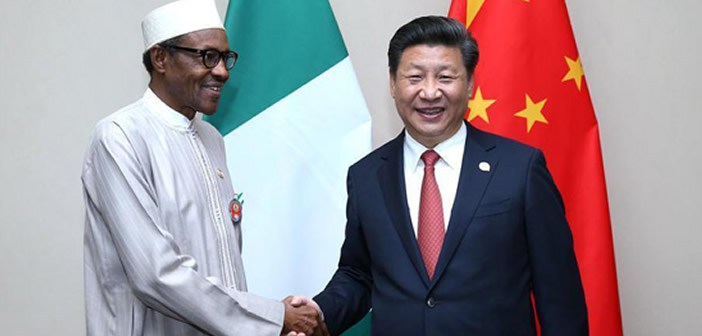
By Lawal Sale Maida, News Agency of Nigeria (NAN)
Since Nigeria joined the Belt and Road Initiative (BRI) in 2018 at a summit in Beijing, Nigeria has recorded tremendous success, resulting in being the Africa’s largest economy and the most populous nation in Africa.
BRI — a Chinese proposal to build a silk road economic belt and 21st Century maritime silk road in cooperation with related countries — was unveiled by President Xi Jinping during his visit to South Asia in 2013 to make Africa part of BRI.
Also, the declaration of the Forum on China Africa Cooperation (FOCAC) 2018 in Beijing Summit and its 2019-2021 African Plan indicates that Africa is an important partner in the BRI cooperation.
Nigeria is among the 40 African countries that signed the memorandum of understanding with Beijing to the partnership of BRI.
So far, 126 countries, including 26 European countries, have also signed BRI cooperation agreements with China.
Further to this, the initiative and its core concepts have been incorporated into the G-20, the Asia-Pacific Economic Cooperation and the Shanghai Cooperation Organisation.
The BRI has, therefore, become an important platform for achieving the UN’s 2030 Agenda for Sustainable Development.
The initiative focuses on promoting policy coordination, connectivity of infrastructure and facilities, unimpeded trade, financial integration and closer people-to-people ties through a consultative process and joint efforts with a goal of bringing benefits to all.
According to Charles Onunaiju, Director Centre for China Studies in Nigeria, Nigeria has already started witnessing early harvest of BRI effects.
He observes that the recent photo exhibition of some vital infrastructure and industrial projects carried out by the Chinese companies in Nigeria under the BRI policy are the proofs.
He observes that BRI was initially concentrated in East Africa where Beijing was developing multibillion-dollar mega infrastructural projects.
Such projects include in Kenya’s Nairobi-Mombasa standard gauge rail line, Ethiopia’s Addis– Djibouti standard rail line and Tazara railway linking the port city of Dar el Salam in Tanzania to the town of Kapiri Mposhi in Zambia’s central province.
Nigeria has had its fair share of many infrastructural projects over the years as government is rapidly engaging the Chinese.
Completed projects and ongoing ones in Nigeria include the popular Abuja–Kaduna standard gauge rail line, Abuja rail mass transit, new terminal at the Nnamdi Azikiwe International Airport, Abuja, Lagos–Ibadan standard gauge rail line, Port Harcourt International Airport, Port Harcourt, Malam Aminu Kano International Airport, Kano, Lekki deep sea port project and Abuja township road project, among others.
Unarguably, infrastructure development by the Chinese in partnership with Nigerian government has been making impact in the lives of many Nigerians.
For instance, the Kaduna to Abuja rail service that was inaugurated in 2016 has created major transportation channel from the capital city to the industrial and metropolitan Kaduna.
The Abuja–Kaduna rail line has also improved investment environment, promoted business trade and safer passenger traffic and cargo transportation between the two cities.
Similarly, dozens of Chinese enterprises of different scale are almost in every state of Nigeria, thriving and contributing to the economy of those states and Nigeria.
Charge d’Affaires of the Embassy of People’s Republic of China in Nigeria Zhao Yong says trade volume between Nigeria and China has risen to 15.3billion dollars in 2018 –10.8 per cent higher than that of 2017.
Similarly, Mr Li Xuda, Chinese Embassy Cultural Attaché and Director China Cultural Centre, expresses gratitude to the Nigerian government and Nigeria Railway Corporations for the smooth relationship between Nigeria and China on BRI.
Both of them agree that trades between China and African countries continue to grow significantly, testifying to the deepening economic relations between the two sides.
China Customs Administration corroborates this assertion, noting that trade volume between China and Africa rose from 10.6 billion dollars in 2000 to 204.2 dollars in 2018.
In the same vein, the Export-Import bank of China (ChinaEximBank), claims that it so far funded more than 87 billion dollar-project in more than 40 African countries that are mostly BRI partners.
President Xi Jinping explains that no matter how the international situation changes and in spite of the interference of certain powers, the original aspirations of China and Africa for win-win cooperation and common development remain.
According to him, it is the resolve of China to jointly build a closer community with a shared future that will not falter.
Analysts, therefore, observe that China and Africa cooperation have moved from the pre-independent political cooperation of 1950s to the post-millennium economic cooperation of the 21st Century.
To sustain the commitment, Chinese foreign ministers have made it a duty to visit Africa at the beginning of every new year.
The idea for such visits is because of China’s belief that economies around the world are becoming more independent, especially after the end of cold war and Africa as a big group of countries.
Recently, Foreign Minister Wang Yi visited Egypt, Djibouti, Eritrea Burundi and Zimbabwe from Jan. 7 to Jan.13.
During his visit to the continent, Wang promised Egypt to help the country in fighting extremism.
In Djibouti, he said China was willing to view relations with Djibouti from a strategic long term perspective and deepen political mutual trust.
He reiterated that the two countries should build BRI together, vigorously promote bilateral pragmatic cooperation and push China-Djibouti strategic partnership to a new level.
In Zimbabwe, China has increasingly broadened its ties to include the construction of a new parliament building estimated to cost more than 100 million dollars.
In Burundi, the Chinese foreign minister assured President Pierre Nkurunziza of continued support in education, energy and agriculture.
Diplomats, therefore, note that there ought to be tremendous achievements for the more than 40 country members of the BRI as the initiative represents an authentic attempt by China to practise diplomacy based on inclusiveness, equal opportunity and respect for the diversity of cultures and political systems.(NANFeatures)
**If used, please credit the writer as well as News Agency of Nigeria (NAN)
